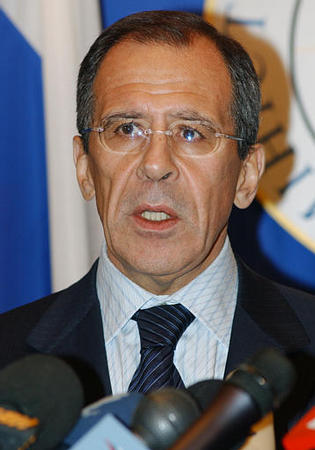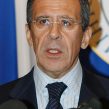
RUSSIA BLAMES TALIBAN FOR UPRISING IN UZBEKISTAN
Publication: Eurasia Daily Monitor Volume: 2 Issue: 96
By:

Official statements emanating from Moscow on the unfolding crisis in eastern Uzbekistan firmly place the blame on Taliban elements promoting political violence within Andijan. Russian Foreign Minister Sergei Lavrov first emphasized this aspect on Saturday, May 14, asserting that the disturbing news from Uzbekistan was in fact “evidence” that events were planned in advance and orchestrated by Islamic fundamentalists. Thus, Russian authorities have been less preoccupied with the level of force used in Andijan and more interested in drawing attention to possible links with Afghanistan.
Lavrov was equally confident that the Uzbek regime was capable of coping with the security situation and the ensuing political fallout. However, he pieced together in his analysis multifarious groups, including Taliban elements and other Islamic radicals, as perpetrators and leaders of the protests, which provoked an overwhelming use of force from the Uzbek security agencies. Lavrov was quick to make the link with terrorism: “If we condone the terrorists in this way and apply double standards with regard to them, we will put the whole region on the verge of crisis.” The Russian Foreign Ministry clearly wanted to divert attention away from how the Uzbek security forces acted and reaffirm the need to examine the events for links with Islamic extremism and terrorism. Also on May 14, the Russian Foreign Ministry made unambiguous attempts to support Lavrov’s views.
Valery Loshchinin, Russian first deputy foreign minister, told NTV Mir that the troubles Andijan had been carefully planned in advance and followed a specific scenario. Utilizing earlier Russian models for explaining the collapse of the Askar Akayev regime in Kyrgyzstan, he said that the crisis ensued from the weakness of the authorities, social problems, and the added burden of the nefarious influence of extremist groups. As the Russian Foreign Ministry reacted to the rapidly developing crisis in Uzbekistan, a presidential dialogue was simultaneously initiated. Presidents Vladimir Putin of Russia and Islam Karimov of Uzbekistan discussed the situation by telephone, agreeing that the immediate concern was the potential threat to the stability of the whole region.
Karimov himself was notably slow to speak publicly about the crackdown in Andijan, though he soon took up the Russian line and placed the blame on Islamic fundamentalists. “What was dangerous for us was that the situation that had formed yesterday could have been used by certain people who would try to organize chaos so that this chaos breaks out onto the streets,” affirmed Karimov. In his opinion the events that erupted in Andijan required at least six months of planning. “The law-enforcement agencies know practically every organizer of the events by name — these are the leaders of the Akramiya movement. Their final goal is to unite all Muslims and create a Muslim caliphate in Central Asia,” Karimov boasted, alluding to the aims of Hizb-ut-Tahrir. Karimov maintained that external radical forces had assessed the potential to repeat the “revolutionary” model experienced in Kyrgyzstan and overthrow the government; in Uzbekistan the same weakness of local authorities would not be repeated.
General Vladimir Vasiliyev, chairman of the State Duma security committee, expressed the concern of Russian members of parliament that an Islamist insurgency could ensue in Uzbekistan. His colleague Mikhail Grishankov, deputy chairman of the State Duma security committee, observed that an attack on military units, against prisons, and the shooting of guards could only be described as political thuggery. Grishankov scorned the notion that the people had rebelled against the Karimov regime or that their actions could be construed as representing the actions of an “opposition.”
Karimov’s initial grip on power when the crisis began enabled the regime to stifle information flowing from Andijan, avoiding any imminent risk of seeing the trouble spread to the capital. Few Uzbeks in Tashkent had access to Russian television stations and even fewer to foreign broadcasts able to report freely on the scale of casualties inflicted by the Uzbek security forces. Interior Troops prevented numerous Russian journalists from entering Andijan, and but they were able to report seeing columns of Uzbek soldiers being sent to the city.
Despite the international outrage that has followed the killing of several hundred civilians in Andijan, Russia has consistently tied these events to external involvement and called for a wider dialogue on terrorism and Islamic extremism. Lavrov told a news conference in Vienna on May 15 that Russia would prefer the Andijan events to be thoroughly investigated by the UN Counter-terrorism Committee, as well as by the anti-terrorist structures of the CIS and the Shanghai Cooperation Organization (SCO). Such investigations would not touch upon the response of the Uzbek government, but instead focus on the network of extremists and terrorists responsible for attempting to destabilize Uzbekistan. Russia’s perspective on the recent upsurge of political violence in Uzbekistan has evoked a clarion call for an investigation that will unite the international community in its opposition to terrorism.
Moscow, for the time being, seeks to raise the stakes in the crisis in Uzbekistan, believing the situation there will become calmer in the days ahead and linking the “incursion” with the Afghan Taliban. Kremlin advisors may calculate that the current Western outrage against the human rights abuses that were so plainly in evidence in the Uzbek response may give way to a longer-term approach.
(RTR Russia TV, Itar-Tass, Center TV, NTV Mir, May 14; Interfax, May 14 and 15)




